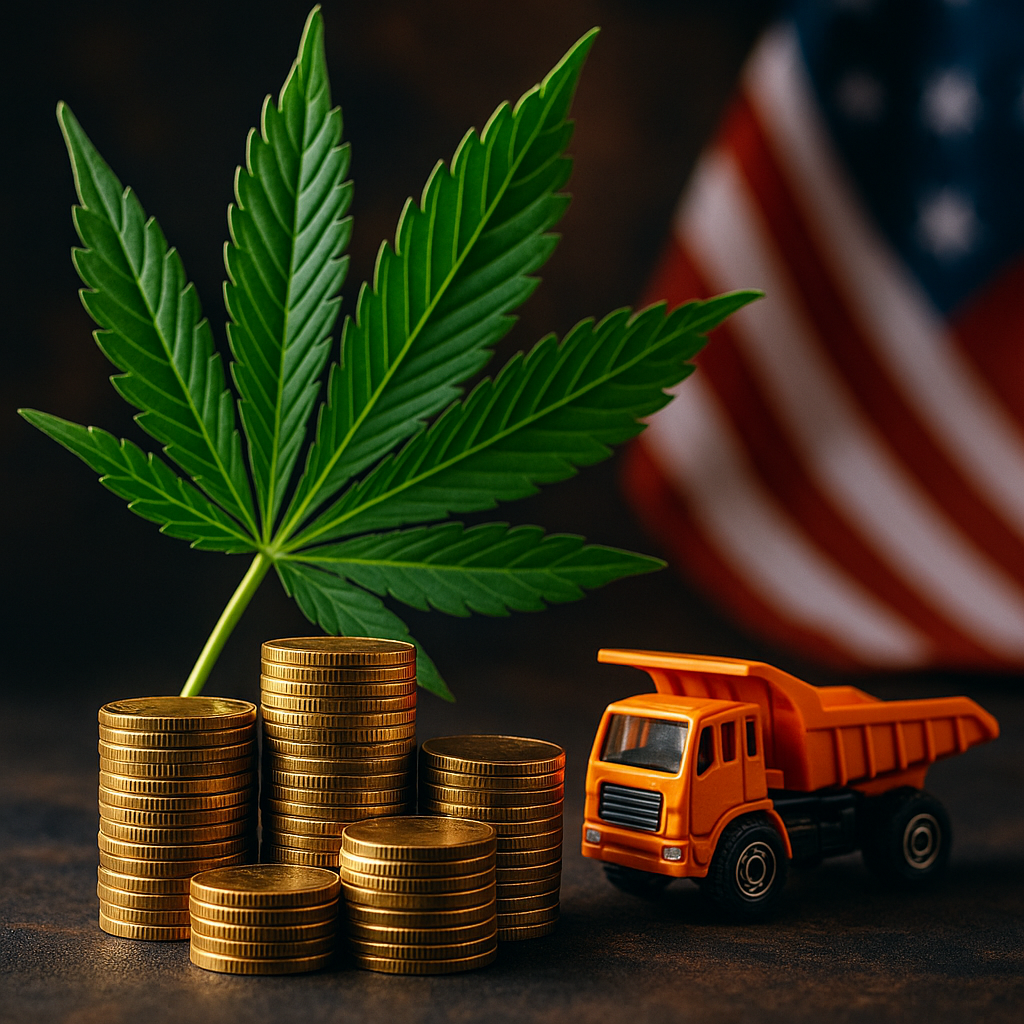Michigan lawmakers debate 32% wholesale cannabis tax, pitched to fund roads, amid warnings it may drive consumers to the illicit market.
When Michigan voters approved legal recreational marijuana in 2018, they did so with the promise of economic opportunity, social reform, and a steady new revenue stream for the state. Seven years later, that stream has become a river. In 2024 alone, Michiganders bought $10 billion worth of cannabis, generating more than $331 million in tax disbursements for municipalities, schools, and road projects.
Now Gov. Gretchen Whitmer and legislative Democrats want to widen the channel even further. Their proposal: slap a new 32 percent wholesale excise tax on cannabis sales, nearly doubling the overall tax burden once existing retail levies are factored in. Whitmer calls it a fix for a “loophole” that exempts marijuana from wholesale taxes already imposed on tobacco. The governor argues the change could deliver an extra $470 million annually — money she wants earmarked primarily for road repairs and infrastructure upgrades.
The idea has backing from key lawmakers, including Senate Appropriations Chair Sarah Anthony, who says industries that rely heavily on Michigan’s highways should contribute more to their upkeep. But the plan has also triggered alarm bells among consumer advocates, policy analysts, and the cannabis industry itself. Critics say the tax would punish consumers, weaken the legal market, and hand an unintended gift to illicit sellers.
This standoff between the promise of public revenue and the peril of overtaxation encapsulates a debate rippling far beyond Michigan’s borders. States with mature cannabis markets are grappling with the same question: how much taxation is too much before the legal market collapses under its own weight?
The Long Road to a New Tax
To understand the stakes, it helps to revisit the timeline.
- 2018: Michigan voters approve Proposal 1, legalizing adult-use cannabis.
- 2019–2023: Sales climb steadily, outpacing expectations.
- 2024: Michigan sets a national record with $10 billion in sales, proving that the Great Lakes State is now one of the nation’s cannabis powerhouses. The state disburses $331 million in revenue to schools, municipalities, and infrastructure.
- Feb. 2025: In her budget address, Whitmer unveils the wholesale tax plan.
- Sept. 2025: Senate Democrats signal support, though no legislation has been formally introduced.
If adopted, the wholesale tax would join the existing 10 percent excise tax on retail cannabis sales and Michigan’s 6 percent sales tax, bringing the combined effective rate into territory rarely seen outside states like California.
Supporters See a Fair Tradeoff
For Whitmer and her allies, the wholesale tax is framed as a matter of equity and necessity. Tobacco is taxed at wholesale. Alcohol is taxed at wholesale. So why should cannabis — now a mainstream consumer good generating billions in commerce — get a pass?
Sen. Anthony, who wields significant influence as chair of Senate Appropriations, has put the case bluntly: if cannabis businesses are profiting from Michigan’s infrastructure, they should pay more for its upkeep. Heavy freight traffic from cultivation and distribution facilities takes a toll on roads, she argues, just as other industries do.
Beyond principle, there’s the math. Michigan’s roads are notoriously battered — a running sore in state politics for decades. Whitmer herself campaigned in 2018 on the slogan “Fix the Damn Roads.” By channeling hundreds of millions in new cannabis taxes directly into infrastructure, the governor sees a way to finally make good on that promise without raising general income or property taxes.
The politics are attractive, too. Infrastructure spending is broadly popular, and voters tend to support “sin taxes” on products like tobacco, alcohol, and cannabis more than broad-based levies. From that angle, taxing weed wholesale looks like a low-risk, high-reward maneuver.
Critics Warn of a Pricey Mistake
Opponents, however, see the proposal as a textbook case of killing the goose that lays the golden egg.
The Marijuana Policy Project (MPP) argues the new tax unfairly targets consumers who already pay steep premiums compared with alcohol drinkers. Michigan’s effective cannabis tax rate is already higher than what residents pay on liquor. Add a 32 percent wholesale hit, and the gap grows absurd.
Then there’s the illicit market. RAND Corporation studies have shown that when cannabis taxes rise too high, consumers turn back to unregulated sellers. California provides a cautionary tale: despite legalization in 2016, its black market remains robust, in part because legal cannabis is taxed so heavily that illicit prices remain more attractive.
For Michigan, where a robust unlicensed market has always operated in parallel to the legal one, the fear is real. Raising taxes could push consumers — particularly lower-income buyers and medical patients — away from dispensaries and back to street corners. That would mean less state revenue, not more, and could unravel progress made toward safe, regulated access.
Industry leaders also warn about competitiveness. Michigan cannabis is not just sold in Michigan. It fuels tourism and, in some cases, diversion to neighboring states. Price spikes could dampen both, cutting into the very tax base the proposal aims to grow.
Data Points That Matter
The debate isn’t just philosophical. A few key data points will determine whether Whitmer’s plan succeeds or stumbles:
- Wholesale vs. Retail Prices: If wholesale prices remain strong, the industry might absorb the new tax without dramatically raising shelf prices. If margins tighten, consumers will feel the squeeze.
- Revenue Projections: Will the promised $470 million in new revenue materialize? Or will illicit market shifts and reduced sales eat into those gains?
- Comparisons with Other States: California has paused cannabis tax increases after backlash. Maryland and Ohio are considering hikes but haven’t implemented them yet. These outcomes will serve as real-world test cases.
- Equity Impacts: Minority-owned cannabis businesses, often operating with thinner margins, may be disproportionately harmed by a wholesale levy. That raises questions about whether Michigan’s equity promises will be undermined.
The National Context
Michigan isn’t debating this in a vacuum. Across the country, states are adjusting cannabis tax regimes as their markets mature.
- California has faced significant pushback and has paused planned increases to avoid further fueling the illicit market.
- Ohio is weighing a tax increase as part of its budget strategy, despite only recently launching its recreational market.
- Maryland floated new levies in its budget, signaling another state looking to cannabis to fill fiscal gaps.
The National Conference of State Legislatures notes that cannabis taxation is still a work in progress nationwide, with no standardized model. Michigan’s decision could therefore set precedent, especially given its size and outsized role in national cannabis commerce.
Arizona as a Counterexample
While Michigan eyes a wholesale tax, Arizona stands as a counterpoint. The Grand Canyon State taxes cannabis at a flat 16 percent excise rate — with no wholesale levy. The result? Arizona’s legal market remains competitive with its illicit one, while still generating robust tax revenues for public health, education, and community programs.
Cannabis advocates argue this approach proves you don’t need punitive tax rates to generate meaningful revenue. Arizona’s stability underscores the risk Michigan runs by overreaching: drive consumers away, and you collect less, not more.
What Comes Next
For now, the Whitmer plan remains just that: a plan. No legislation has been filed, meaning details such as implementation timing, distribution formulas, and enforcement mechanisms remain fuzzy. Lawmakers could water down the rate, add exemptions for medical cannabis, or phase the tax in gradually.
What’s clear is that the debate has only begun. Supporters will frame it as a chance to modernize Michigan’s tax code and finally fix the damn roads. Opponents will paint it as an attack on consumers and an existential threat to the legal market.
Where Michigan lands could reverberate nationally, shaping how other states balance the promise of cannabis revenue against the perils of overtaxation. For a plant that has already rewritten so many rules, this next chapter is all about the price tag.
***
Trap Culture is the ultimate destination for cannabis enthusiasts who want to experience the best of Arizona’s cannabis culture. Whether you are looking for the hottest cannabis-friendly events, the latest news on cannabis legalization, trends in the industry and exclusive, limited-edition products from the top brands in the market, Trap Culture has you covered. Visit our website to learn more about our events, our blog, and our store. Follow us on social media to stay updated on the latest news and promotions. Join the Trap Culture family and experience the most immersive and engaging social cannabis events in Arizona.
Follow us on social media





